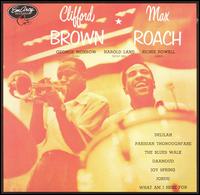Clifford Brown & Max Roach
| Clifford Brown & Max Roach | ||||
|---|---|---|---|---|
 |
||||
| Studio album by Clifford Brown & Max Roach Quintet | ||||
| Released | Early December 1954 | |||
| Recorded | August 2–3 & 6, 1954 (original LP) February 24–25, 1955 Capitol Studios, Los Angeles |
|||
| Genre | Jazz | |||
| Length | 43:44 | |||
| Label |
EmArcy MG 26043 |
|||
| Producer | Bob Shad | |||
| Clifford Brown & Max Roach Quintet chronology | ||||
|
||||
| Professional ratings | |
|---|---|
| Review scores | |
| Source | Rating |
| Allmusic | |
Clifford Brown & Max Roach is a 1954 album by influential jazz musicians Clifford Brown and Max Roach as part of the Clifford Brown and Max Roach Quintet, described by The New York Times as "perhaps the definitive bop group until Mr. Brown's fatal automobile accident in 1956". The album was critically well received and includes several notable tracks, including two that have since become jazz standards. The album was inducted into the Grammy Hall of Fame in 1999. It is included in Jazz: A Critic's Guide to the 100 Most Important Recordings at #34, where it is described by New York Times jazz critic Ben Ratliff as "one of the strongest studio albums up to that time".
First released as a 10" vinyl in December 1954 (MG 26043), it included only five tracks: "Delilah", "Parisian Thoroughfare", "Daahoud", "Joy Spring" and "Jordu", all recorded at Capitol Studios in Hollywood, in August 1954. In 1955, EmArcy released a regular 12" vinyl (MG-36036), adding "The Blues Walk" and "What Am I Here For", from a February 1955 session at Capitol Studios in New York City. Since then, it has been multiply reissued, including in a 2000 edition by Verve Records that contains additional takes and a previously unissued track.
The album is one of several that resulted from the partnership between Roach and Brown after Roach invited Brown in New York City to join him in creating a band. Brown and Roach together selected additional musicians to comprise the quintet from among the jazz musicians currently active in Hollywood. The band's early line-ups included Sonny Stitt, Teddy Edwards, Carl Perkins and George Bledsoe, but by the time the first of these sessions was recorded in August 1954, they had been replaced by the more long-term line-up of Clifford Brown, Harold Land and Richie Powell, the brother of jazz luminary Bud Powell. The band was prominent in the jazz scene; Land, brought in when predecessor Edwards declined to tour with the group, experienced an enormous increase in his reputation in the jazz world, while Land's successor (Sonny Rollins) would be springboarded by the visible position into superstardom.
...
Wikipedia
